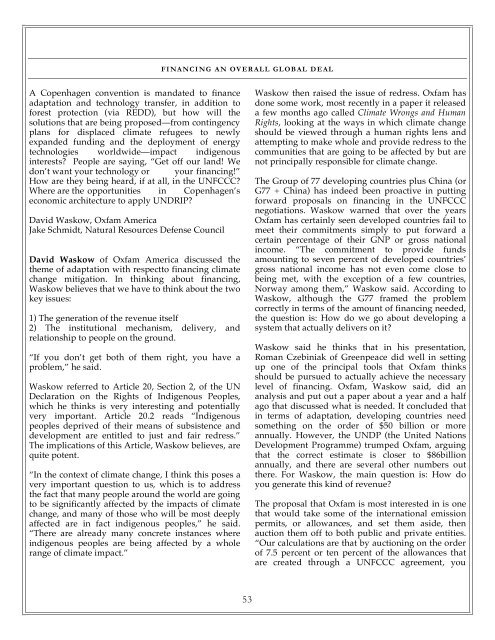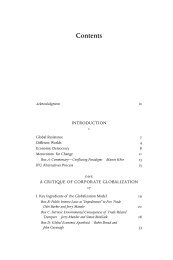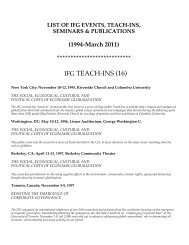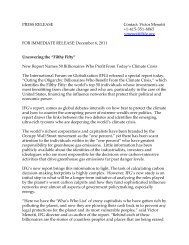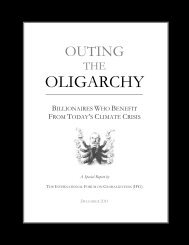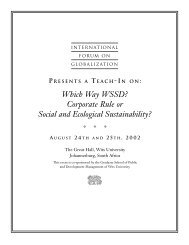UNDRIP Report - English FINAL - International Forum on Globalization
UNDRIP Report - English FINAL - International Forum on Globalization
UNDRIP Report - English FINAL - International Forum on Globalization
Create successful ePaper yourself
Turn your PDF publications into a flip-book with our unique Google optimized e-Paper software.
FI NA NCI NG A N OV ER ALL GL OB AL D E AL<br />
A Copenhagen c<strong>on</strong>venti<strong>on</strong> is mandated to finance<br />
adaptati<strong>on</strong> and technology transfer, in additi<strong>on</strong> to<br />
forest protecti<strong>on</strong> (via REDD), but how will the<br />
soluti<strong>on</strong>s that are being proposed—from c<strong>on</strong>tingency<br />
plans for displaced climate refugees to newly<br />
expanded funding and the deployment of energy<br />
technologies worldwide—impact indigenous<br />
interests? People are saying, “Get off our land! We<br />
d<strong>on</strong>’t want your technology or your financing!”<br />
How are they being heard, if at all, in the UNFCCC?<br />
Where are the opportunities in Copenhagen’s<br />
ec<strong>on</strong>omic architecture to apply <str<strong>on</strong>g>UNDRIP</str<strong>on</strong>g>?<br />
David Waskow, Oxfam America<br />
Jake Schmidt, Natural Resources Defense Council<br />
David Waskow of Oxfam America discussed the<br />
theme of adaptati<strong>on</strong> with respectto financing climate<br />
change mitigati<strong>on</strong>. In thinking about financing,<br />
Waskow believes that we have to think about the two<br />
key issues:<br />
1) The generati<strong>on</strong> of the revenue itself<br />
2) The instituti<strong>on</strong>al mechanism, delivery, and<br />
relati<strong>on</strong>ship to people <strong>on</strong> the ground.<br />
“If you d<strong>on</strong>’t get both of them right, you have a<br />
problem,” he said.<br />
Waskow referred to Article 20, Secti<strong>on</strong> 2, of the UN<br />
Declarati<strong>on</strong> <strong>on</strong> the Rights of Indigenous Peoples,<br />
which he thinks is very interesting and potentially<br />
very important. Article 20.2 reads “Indigenous<br />
peoples deprived of their means of subsistence and<br />
development are entitled to just and fair redress.”<br />
The implicati<strong>on</strong>s of this Article, Waskow believes, are<br />
quite potent.<br />
“In the c<strong>on</strong>text of climate change, I think this poses a<br />
very important questi<strong>on</strong> to us, which is to address<br />
the fact that many people around the world are going<br />
to be significantly affected by the impacts of climate<br />
change, and many of those who will be most deeply<br />
affected are in fact indigenous peoples,” he said.<br />
“There are already many c<strong>on</strong>crete instances where<br />
indigenous peoples are being affected by a whole<br />
range of climate impact.”<br />
Waskow then raised the issue of redress. Oxfam has<br />
d<strong>on</strong>e some work, most recently in a paper it released<br />
a few m<strong>on</strong>ths ago called Climate Wr<strong>on</strong>gs and Human<br />
Rights, looking at the ways in which climate change<br />
should be viewed through a human rights lens and<br />
attempting to make whole and provide redress to the<br />
communities that are going to be affected by but are<br />
not principally resp<strong>on</strong>sible for climate change.<br />
The Group of 77 developing countries plus China (or<br />
G77 + China) has indeed been proactive in putting<br />
forward proposals <strong>on</strong> financing in the UNFCCC<br />
negotiati<strong>on</strong>s. Waskow warned that over the years<br />
Oxfam has certainly seen developed countries fail to<br />
meet their commitments simply to put forward a<br />
certain percentage of their GNP or gross nati<strong>on</strong>al<br />
income. “The commitment to provide funds<br />
amounting to seven percent of developed countries’<br />
gross nati<strong>on</strong>al income has not even come close to<br />
being met, with the excepti<strong>on</strong> of a few countries,<br />
Norway am<strong>on</strong>g them,” Waskow said. According to<br />
Waskow, although the G77 framed the problem<br />
correctly in terms of the amount of financing needed,<br />
the questi<strong>on</strong> is: How do we go about developing a<br />
system that actually delivers <strong>on</strong> it?<br />
Waskow said he thinks that in his presentati<strong>on</strong>,<br />
Roman Czebiniak of Greenpeace did well in setting<br />
up <strong>on</strong>e of the principal tools that Oxfam thinks<br />
should be pursued to actually achieve the necessary<br />
level of financing. Oxfam, Waskow said, did an<br />
analysis and put out a paper about a year and a half<br />
ago that discussed what is needed. It c<strong>on</strong>cluded that<br />
in terms of adaptati<strong>on</strong>, developing countries need<br />
something <strong>on</strong> the order of $50 billi<strong>on</strong> or more<br />
annually. However, the UNDP (the United Nati<strong>on</strong>s<br />
Development Programme) trumped Oxfam, arguing<br />
that the correct estimate is closer to $86billi<strong>on</strong><br />
annually, and there are several other numbers out<br />
there. For Waskow, the main questi<strong>on</strong> is: How do<br />
you generate this kind of revenue?<br />
The proposal that Oxfam is most interested in is <strong>on</strong>e<br />
that would take some of the internati<strong>on</strong>al emissi<strong>on</strong><br />
permits, or allowances, and set them aside, then<br />
aucti<strong>on</strong> them off to both public and private entities.<br />
“Our calculati<strong>on</strong>s are that by aucti<strong>on</strong>ing <strong>on</strong> the order<br />
of 7.5 percent or ten percent of the allowances that<br />
are created through a UNFCCC agreement, you<br />
53


